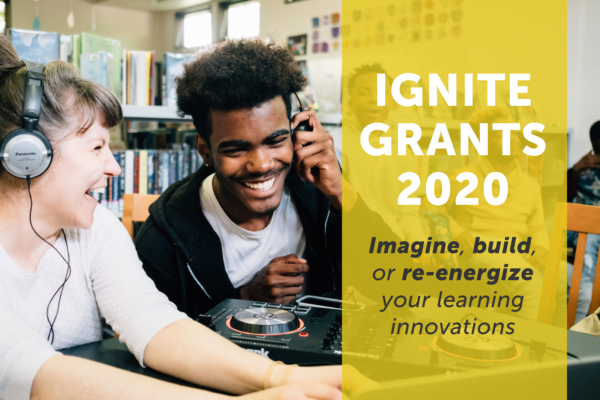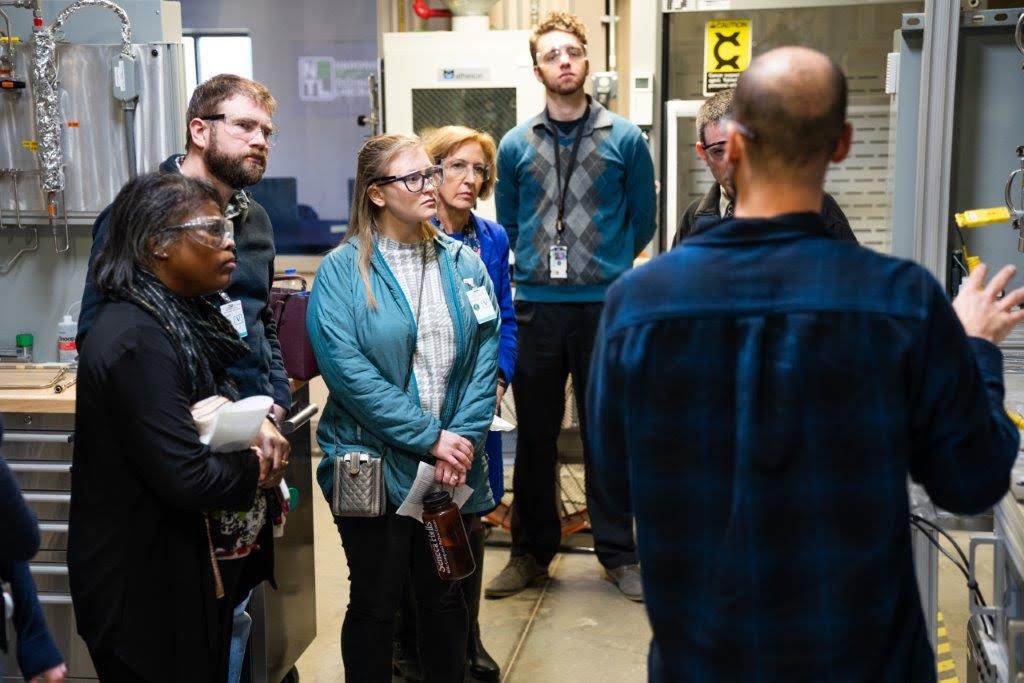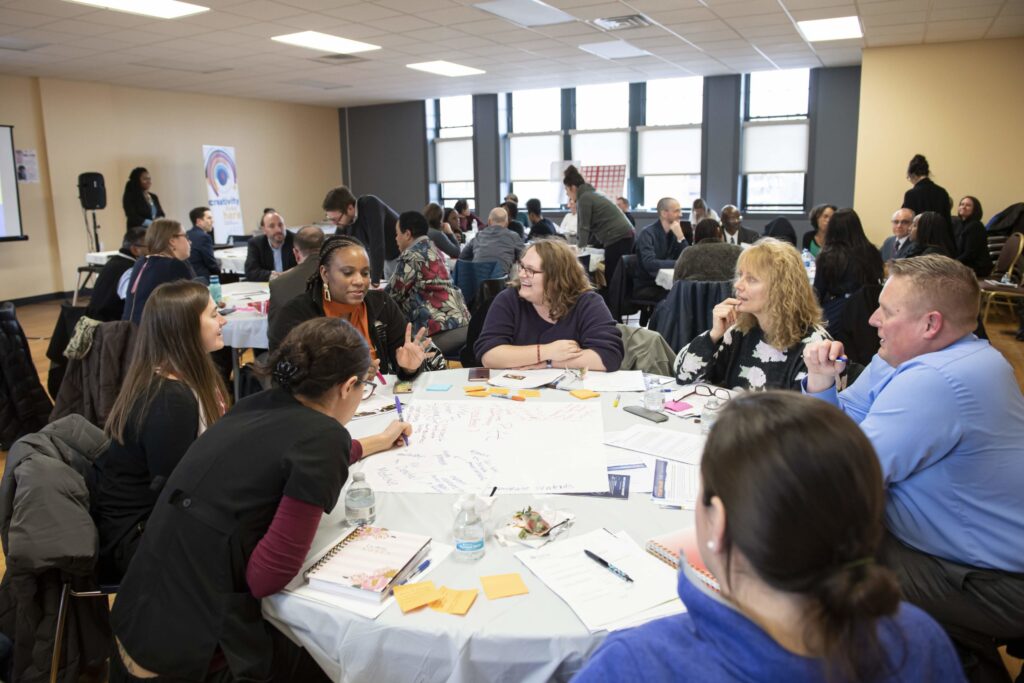As I write, the scene before me belies a calm our collective “we” has not felt since our last edition of these Field Notes. I’m sitting at home, it’s warm and summer-like, and the sun is shining. My cat snoozes in her usual perch. And so, I begin this seasonal reflection, amongst these small comforts, by first saying: You are loved. Thank you for all you do to better the lives of children, and hence, the world.
From the banner call of the Tomorrow campaign, to the heads-down huddles of the Remake Learning team, the past three months defy description. At this writing, the nation is in week two (year 400?) of the resistance to end anti-Blackness in America. Meanwhile, a generation graduates without the traditional pomp and circumstance, and we work to find new ways to celebrate their accomplishments and amazing promise.
As we turn toward summer learning, I am grateful to the RK Mellon Foundation for their support of the Pittsburgh Learning Collaborative, a coalition of over 30 organizations working together in response to the pandemic. This work will bolster efforts to coordinate summer learning and enrichment opportunities, communicate and support families and caregivers directly, and generate resources to connect public Wi-Fi and tech accessibility. I send my gratitude to A+ Schools, APOST, the Education Partnership, Reading is Fundamental, Community Kitchen, and others who were instrumental in garnering this support.
I haven’t even touched on the accomplishments of Remake Learning’s working groups, the incredible stories shared, or the gatherings held to express community care and knowledge-sharing; the space below will guide you through it all. For now, I leave you with this: To truly remake learning, we must center equity. Our network continues to attend to our own transformation and confront the legacy of whiteness and its violence against Black people, and we will continue to amplify the work of Black educators, learners, leaders, and communities. We are at their service, and your service, now and forever.
Remake Learning Grants
Remake Learning offers small-scale grants to catalyze new and innovative learning projects, both in-school and out-of-school.
Ignite Grants 2020

On May 22, Remake Learning announced the 20 recipients of its most recent round of Ignite Grants. Each grant awarded $5,000 to support a network member in imagining, building, or re-energizing a learning project or program. With $100,000 in total investment, Ignite Grants will help schools, organizations, and educators in eight counties across southwestern Pennsylvania and northern West Virginia launch or continue a wide range of initiatives. Funded projects will modernize facilities, explore issues of racial and social justice, build deeper mentoring relationships, and introduce more students to science, robotics, and engineering in culturally relevant ways. Funded projects are expected to impact over 4,000 students in the next year.
143 Grants
In partnership with The Grable Foundation, Remake Learning helped identify and administer 143 anonymous grants of $1,000 to in- and out-of-school educators across the country. The grants led into the launch of the Tomorrow campaign, powered by Remake Learning. The campaign launched on 143 Day in Pennsylvania (May 22), a day honoring Mr. Rogers, who once said: “It takes one letter to say I and four letters to say love and three letters to say you. One hundred and forty-three.”
Network Activities
Activities are designed to cultivate and support a regional community of peer professionals committed to the vision and values of Remake Learning.
Response to COVID-19
To support network members during this challenging and uncertain time, Remake Learning pivoted to focus on resource curation, best-practice documentation, and virtual community building. RemakeLearning.org launched a landing page for COVID-19, which included a virtual assistant chatbot custom-designed in partnership with IBM to help visitors quickly and easily search resources. Remake Learning hosted three supportive meetups during April and May, including two happy hours on April 16 and May 7, and one check-in with out-of-school providers on April 23, which had nearly 100 educators in attendance. The network’s communications team prioritized a series of related editorial pieces, including a four-part series of promising practices, highlighting how various schools and organizations were adapting to remote learning, plus two features on connectivity and accessibility during the pandemic and a video interview with the Remake Learning team.
Remake Learning Days
Following the guidance of public health officials and the Remake Learning Council and Co-Chairs, Remake Learning Days Across America (RLDAA) announced the postponement of its 2020 festival in March, first planning to reschedule for October, but ultimately deciding to postpone to the spring of 2021. Since March, the RLDAA team has finalized a plan to roll-out a “reimagined” RLDAA over the next 12+ months. All 15 regions originally confirmed for RLDAA 2020 have agreed to the new RLDAA Reimagined timeline, which includes:
- October 2020: A virtual launch event hosted by the RLDAA national team for all regional leads, current event hosts, and prospective event hosts
- January 2021: Launch events hosted in each RLDAA region
- April 22 – May 23, 2021: Remake Learning Days Festival (will occur whether in-person, virtual, or a combination thereof)
- September 2021: Back-to-school celebratory events hosted in each RLDAA region
- October 2021: A culminating event hosted by the RLDAA national team
Tomorrow, powered by Remake Learning
Tomorrow is a campaign that explores what we can do today to make tomorrow a more promising place for all learners. The campaign is powered by Remake Learning and a host of regional, national, and international partners, including the Grable Foundation, transformED, KnoweldgeWorks, Kidsburgh, Project Fuel, and others. From May through October 2020, the campaign will publish original stories, host virtual conversations and meetups, support regional and national celebratory events in education, and offer supportive grants, including the aforementioned 143 Grants and Ignite Grants.
The campaign launched on May 22, with a social media rally that captured nearly 14.2 million impressions and 18.6K engagements through social media and blog posts made by campaign partners and community participants. Through the end of May, the campaign published its first four stories and hosted its first virtual conversation with a panel of high school students, who discussed the impact of COVID-19 to a virtual crowd of 70 Zoom attendees.
Shifting Power in Educational Research & Development
Shifting Power is a collaborative initiative between Remake Learning and the University of Pittsburgh School of Education funded by the Bill and Melinda Gates Foundation. Beginning in August 2020, the initiative will pair 20 Black and Latinx educators with 20 researchers across institutions in Western Pennsylvania to co-develop and implement research projects with a deeply place-based, emancipatory R&D infrastructure, ultimately helping educators to lead and solve their own problems of practice.
During the early months of 2020, the Shifting Power project team continued to take shape. In addition to the Co-Principal Investigators Valerie Kinloch and Allyce Pinchback-Johnson, the project welcomed Medina Jackson and Meredith Bortz as consultants on equity and communication, respectively. The project team spent the month of May developing a framework, branding package, and timeline. They plan to open applications for educators and researchers in early June 2020.
Network Events
Remake Learning Meetups and Lunch & Learns continued to convene in-person through early March, prior to the start of COVID-19 quarantine. On February 13, the Empowered Educators series hosted a sold-out third session, while the February 21st Black Power and Automation Lunch & Learn attracted strong attendance and engaging conversation focused on the history and influence of Black culture on the development of cyberculture, labor technology, and more.
March gatherings shifted to virtual platforms, and Dr. Tyra Good hosted an online Lunch & Learn on March 18 exploring social justice and culturally sustaining pedagogies for pre-service teachers.
After a series of COVID-19 pulse checks in April (see above for details), the network hosted a check-in with Empowered Educators participants on May 18. Later that month, the Hip-Hop/STEAM/Entrepreneurs Meetup welcomed ToyzSTEAM, the outreach arm of Toyz Electronics, a Pittsburgh-based educational technology and hardware company.
Rural Outreach
Network members from rural communities convened at various in-person and virtual Meetups and Lunch & Learns over the spring of 2020. On February 19, a small group traveled to the National Energy Technology Laboratory of West Virginia, to tour the facility’s STEM-based spaces. In April and May, rural educators began gathering remotely, beginning with a walkthrough of KnowledgeWorks’ future of learning forecast on April 15. On May 11, rural intermediate units hosted an open discussion and resource sharing session, and just a few days later, on May 14, educators reconvened for a well-attended Lunch & Learn on the use of storytelling and roleplaying games in virtual STEAM learning and classrooms.

In addition, Rural Coordinator Allie Mullins worked to organize the first rural steering committee over the early 2020 months. This group will help guide the structure and topics of rural-based convenings moving forward.
Working Groups
Remake Learning Working Groups gather network members around specific topics and priorities that no single organization can impact alone.
CSforPGH
On March 31, CSforPGH hosted its spring meeting virtually, discussing the methods and strategies attendees were currently using to adapt to remote teaching and learning. Members also discussed adaptation needs for forthcoming 2020 projects, including a major “marquee” event originally slated for summer 2020.
Future of Work Collaborative
The Future of Work Collaborative concluded its year-long exploration of workforce and career readiness with its final meeting and departure of lead Marita Garret in April. Moving forward, conversations and topics on the future of work will be integrated into other Remake Learning programming.
Maker Learning Collaborative
The Maker Learning Collaborative continued to gain momentum this spring, under the guidance of working group lead Nick Schiner, of Digital Promise. Throughout April and May, the group focused on recruiting members for a new steering committee. The committee will play a major role in designing future meetings and programming. The Collaborative also launched the Maker Educators of SWPA Facebook group in April, to support member recruitment and engagement.
Professional Learning Collaborative
Collaborative lead Allyce Pinchback-Johnson returned from maternity leave in mid-March, focusing on scheduling the remaining sessions in the year-long Professional Learning Think Tank series that began in 2019
STE(A)M Ecosystem
The Pittsburgh Regional STE(A)M Ecosystem held its spring meeting virtually on April 16. This gathering was bookended by work on several special projects throughout the spring.
In February, Ecosystem lead LaTrenda Leonard Sherrill co-facilitated a brainstorming session on the University of Pittsburgh Community Engagement Center’s forthcoming STEAM Studio in the Hill District, while Remake Learning provided broader documentation and promotion of the project. She continues to advise on the project as it regroups following COVID-19 closures.

The Ecosystem solidified a similar consulting and documentation role for the STEM Pathways for Underrepresented Students to HigherEd (STEM PUSH) project, funded by the National Science Foundation and coordinated by the University of Pittsburgh. While the project aims to establish a national network of accredited STEM precollege programs, Pittsburgh’s regional Ecosystem will provide leadership in network development and lead the design, production, and dissemination of a playbook, which will provide a framework for other regional ecosystems to follow in developing diverse STEM learning pipelines.
Lastly, the Ecosystem collected and published key takeaways from its STEAM Observation for Cultural Competency project, led by Dr. Gretchen Generett and Yael Silk of the Arts Education Collaborative.
Youth Voice Working Group
In the early months of 2020, the Youth Voice Working Group continued to share its Youth Voice Standards of Practice Toolkit with the network. In May, the group worked with Remake Learning’s Field Director to coordinate and host the first Tomorrow conversation, centered on youth experiences in learning and living during the COVID-19 pandemic.